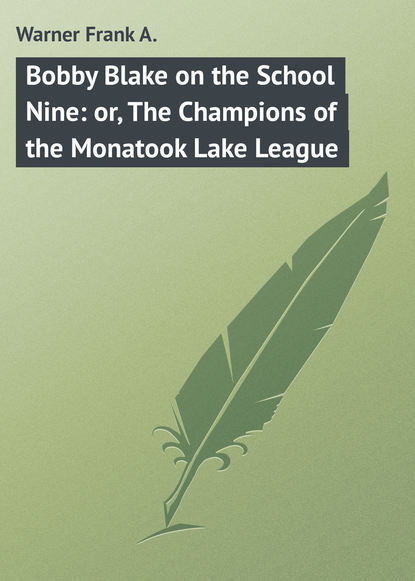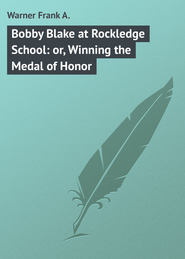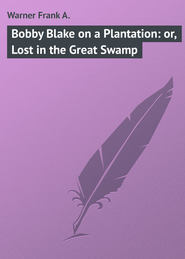По всем вопросам обращайтесь на: info@litportal.ru
(©) 2003-2024.
✖
Bobby Blake on the School Nine: or, The Champions of the Monatook Lake League
Настройки чтения
Размер шрифта
Высота строк
Поля
“Oh, dear,” sighed Betty, as the toot of the train’s whistle was heard up the track. “Here it comes. I just hate to have to say good-bye to you boys.”
“Never mind, Betty,” cried Bobby cheerily. “It won’t be so very long and you’ll hear from us every once in a while. And maybe we’ll be able to come home for a few days at Easter.”
There was a scurrying about as the boys got their hand-baggage together and brushed the snow from their clothes. The train had now come in sight, and a minute later with a great rattle and clamor and hissing of steam it drew up to the platform.
“All aboard!” shouted Mouser, and the four boys scrambled up the steps, Pee Wee as usual bringing up the rear.
They rushed up the aisle and were lucky enough to find two vacant seats next to each other. They turned over the back of one of them, so that two of them could sit facing the others, and tucked away their belongings in the racks and under the seats. Then they threw up the windows so as to have a last word with those they were leaving behind.
The girls had their handkerchiefs out ready to wave a good-bye, and Betty was applying hers furtively to one of her eyes.
“I hope your nose isn’t hurting you, Fred,” she questioned, the mischief glinting out in spite of the tears.
“Not a bit of it,” answered Fred hastily, as though the subject was not to his liking.
“And you’re sure you don’t need the ten cents?”
“Need nothing,” declared Fred, with the magnificent gesture of one to whom money was a trifle. “I’ve got plenty with me.”
Betty drew back a little, and Scat and Pat came along and grasped the four hands that were thrust out to meet theirs.
“Good luck, fellows,” said Scat. “I hope you’ll get on the baseball nine this spring and lay it all over the teams you play against.”
“We’re going to do our best,” Bobby replied.
“Good-bye, boys!” called out Pat. “I sure am sorry to have you goin’. It won’t seem like the same old place when you ain’t here no more.”
“Good-bye, Pat!” the four shouted in chorus.
“If you have any mix-up with Ap while we’re gone, be sure to let us know,” laughed Bobby.
“There won’t be any mix-up,” put in Fred. “Not if Ap sees Pat first, there won’t.”
“Ap will crawfish all right,” confirmed Mouser.
“He’s a wonder at backing out,” added Pee Wee.
The bell of the engine began to clang and the train started slowly out of the station. The little party left behind ran alongside until they reached the end of the platform, shouting and waving.
The travelers, with their heads far out of the windows, waved and called in return until they were out of sight and hearing.
“Betty’s a bully girl, isn’t she, Fred?” remarked Bobby, as they settled back in their seats. “You’re a lucky fellow. I wish I had a sister like her.”
“Ye-e-s,” assented Fred, rather hesitatingly. “Betty’s a brick. That is,” he added hastily, “as far as any girl can be. But don’t be wishing too hard for sisters, Bobby,” he went on darkly. “Girls aren’t all they’re cracked up to be.”
“Especially when they know how to throw,” put in Bobby, with a roguish glint in his eyes.
Fred pretended to think this remark unworthy of an answer, but he rubbed his nose reflectively.
CHAPTER III
THE COMING STORM
For several minutes the boys were the least bit quiet and subdued. There is always something sobering in going away from home and leaving relatives and friends behind, especially when the parting is going to last for many months, and the warm-hearted farewells of the group at the station were still ringing in the boy’s ears.
But it is not in boy nature to remain quiet long, and their irrepressible spirits soon asserted themselves and caused the young travelers to bubble over with fun and merriment.
Besides, Pee Wee and Mouser had said good-bye to their parents the day before in their own homes, and had been stopping over night with their school chums in Clinton. Their depression was but for the moment and was over the thought of leaving behind so much fun and good will as they had found at their chums’ home town, and they helped Bobby and Fred to forget their feeling of homesickness.
There were not many other passengers on the train that morning, so that the boys had plenty of room and could give vent to their feelings without causing annoyance to others. They snatched each other’s caps and threw them in the aisles or under the seats, indulged in good-natured scuffling, sang bits of the Rockledge songs and cut up “high jinks” generally.
Fred and Mouser were seized by a longing for a drink of water at the same moment, and they had a race to see who would get to the cooler first. Fred won and got first drink while Mouser waited for his turn. But Mouser got even by knocking Fred’s elbow so that half the water was spilled over the front of his coat.
“Quit, I tell you, Mouser,” remonstrated Fred, half choking from the effort to drink and talk at the same time.
But Mouser kept on, until suddenly Fred saw a chance to get back at him.
“What does it say there?” he asked, pointing to some words engraved on the lower part of the cooler. “I can’t quite make the letters out from here.”
Mouser innocently bent over, and Fred, taking advantage of his stooping position, tipped his glass and sent a stream of water down his victim’s neck.
There was a startled howl from Mouser as the cold water trickled down his spine. He straightened up with a jerk and chased Fred down the aisle, while Bobby and Pee Wee went into whoops of laughter at his discomfiture.
“That’s no way to drink water, Mouser,” chaffed Bobby as soon as he could speak. “You want to use your mouth instead of taking in through the pores.”
“Oh, dry up,” ejaculated Mouser, making frantic efforts to stuff his handkerchief down his back.
“We’re dry enough already,” chuckled Pee Wee. “Seems to me it’s you that needs drying up.”
“You will jog my elbow, eh?” jeered Fred, who was delighted at the success of his stratagem.
“My turn will come,” grunted Mouser. “It’s a long worm that has no turning,” he added, getting mixed up in his proverbs.
Again the boys shouted and Mouser himself, although he tried to keep up his dignity, ended by joining in the merriment.
In the scramble for seats when they had first boarded the train, Bobby and Fred had had the luck to get the seat that faced forward. Mouser and Pee Wee had to ride backward and naturally after a while they objected.
“You fellows have all the best of it,” grumbled Pee Wee.
“That’s all right,” retorted Fred. “That’s as it should be. Nothing’s too good for Bobby and me. The best people ought to have the best of everything.”
“Sure thing,” Bobby backed him up. “The common people ought to be satisfied with what they can get. You fellows ought to be glad that we let you travel with us at all.”
“Those fellows just hate themselves, don’t they?” Mouser appealed to his seat mate.
“Aren’t they the modest little flowers?” agreed Pee Wee.
“What do you say to rushing them and firing them out?” suggested Mouser.







